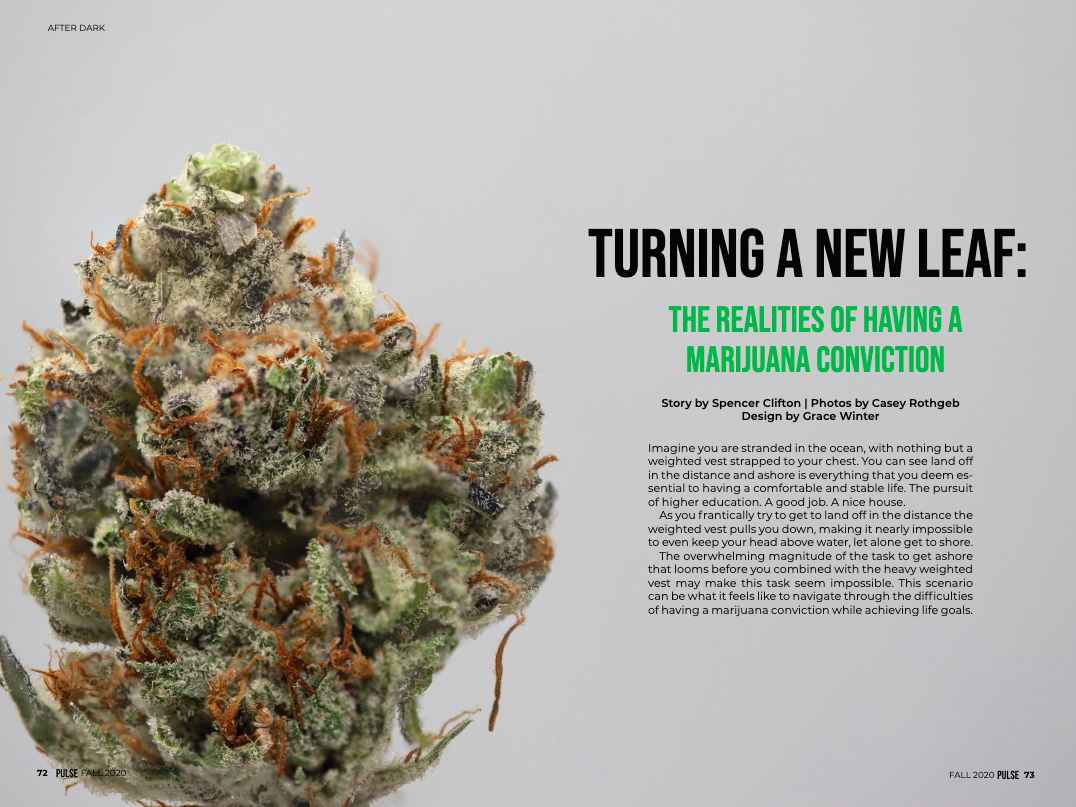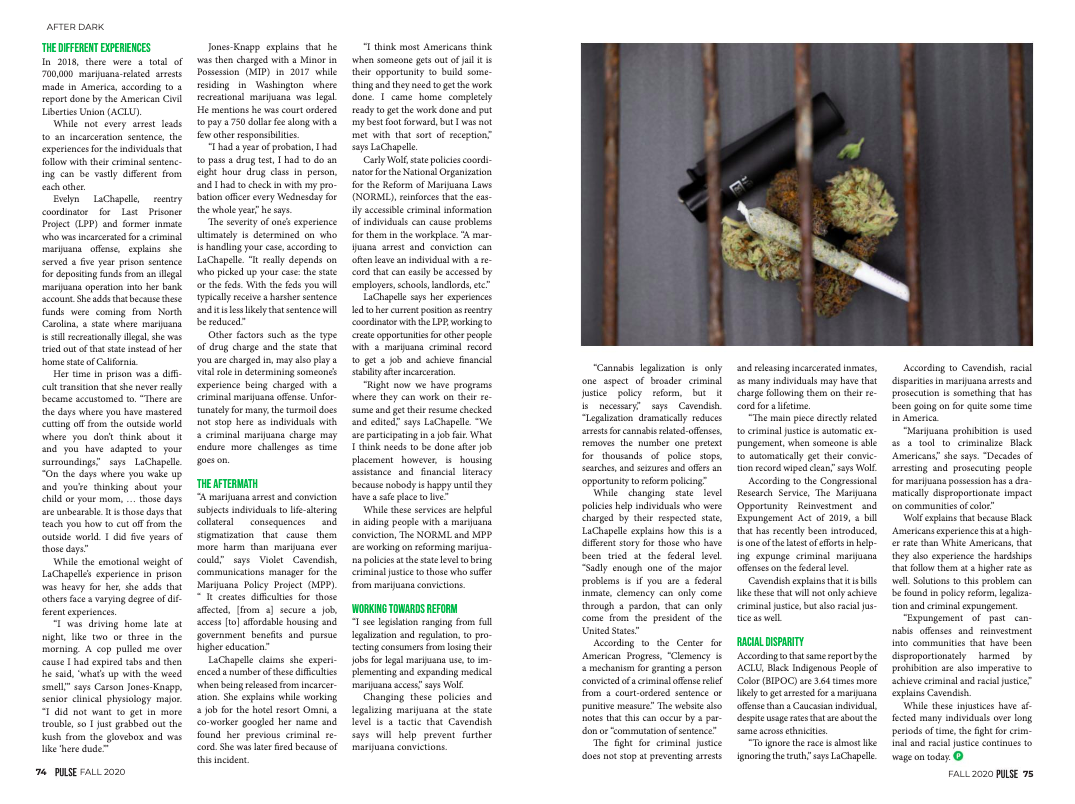Turning a New Leaf: The Realities of Having a Marijuana Conviction
Story by Spencer Clifton | Photos by Casey Rothgeb | Design by Grace Winter
Imagine you are stranded in the ocean, with nothing but a weighted vest strapped to your chest. You can see land off in the distance and ashore is everything that you deem essential to having a comfortable and stable life. The pursuit of higher education. A good job. A nice house.
As you frantically try to get to land off in the distance the weighted vest pulls you down, making it nearly impossible to even keep your head above water, let alone get to shore.
The overwhelming magnitude of the task to get ashore that looms before you combined with the heavy weighted vest may make this task seem impossible. This scenario can be what it feels like to navigate through the difficulties of having a marijuana conviction while achieving life goals.
The Different Experiences
In 2018, there were a total of 700,000 marijuana-related arrests made in America, according to a report done by the American Civil Liberties Union (ACLU).
While not every arrest leads to an incarceration sentence, the experiences for the individuals that follow with their criminal sentencing can be vastly different from each other.
Evelyn LaChapelle, reentry coordinator for Last Prisoner Project (LPP) and former inmate who was incarcerated for a criminal marijuana offense, explains she served a five year prison sentence for depositing funds from an illegal marijuana operation into her bank account. She adds that because these funds were coming from North Carolina, a state where marijuana is still recreationally illegal, she was tried out of that state instead of her home state of California.
Her time in prison was a difficult transition that she never really became accustomed to. “There are the days where you have mastered cutting off from the outside world where you don’t think about it and you have adapted to your surroundings,” says LaChapelle. “On the days where you wake up and you’re thinking about your child or your mom, … those days are unbearable. It is those days that teach you how to cut off from the outside world. I did five years of those days.”
While the emotional weight of LaChapelle’s experience in prison was heavy for her, she adds that others face a varying degree of different experiences.
“I was driving home late at night, like two or three in the morning. A cop pulled me over cause I had expired tabs and then he said, ‘what’s up with the weed smell,’” says Carson Jones-Knapp, senior clinical physiology major. “I did not want to get in more trouble, so I just grabbed out the kush from the glovebox and was like ‘here dude.’”
Jones-Knapp explains that he was then charged with a Minor in Possession (MIP) in 2017 while residing in Washington where recreational marijuana was legal. He mentions he was court ordered to pay a 750 dollar fee along with a few other responsibilities.
“I had a year of probation, I had to pass a drug test, I had to do an eight hour drug class in person, and I had to check in with my probation officer every Wednesday for the whole year,” he says.
The severity of one’s experience ultimately is determined on who is handling your case, according to LaChapelle. “It really depends on who picked up your case: the state or the feds. With the feds you will typically receive a harsher sentence and it is less likely that sentence will be reduced.”
Other factors such as the type of drug charge and the state that you are charged in, may also play a vital role in determining someone’s experience being charged with a criminal marijuana offense. Unfortunately for many, the turmoil does not stop here as individuals with a criminal marijuana charge may endure more challenges as time goes on.
The Aftermath
“A marijuana arrest and conviction subjects individuals to life-altering collateral consequences and stigmatization that cause them more harm than marijuana ever could,” says Violet Cavendish, communications manager for the Marijuana Policy Project (MPP). “ It creates difficulties for those affected [from a] secure a job, access [to] affordable housing and government benefits and pursue higher education.”
LaChapelle claims she experienced a number of these difficulties when being released from incarceration. She explains while working a job for the hotel resort Omni, a co-worker googled her name and found her previous criminal record. She was later fired because of this incident.
“I think most Americans think when someone gets out of jail it is their opportunity to build something and they need to get the work done. I came home completely ready to get the work done and put my best foot forward, but I was not met with that sort of reception,” says LaChapelle.
Carly Wolf, state policies coordinator for the National Organization for the Reform of Marijuana Laws (NORML), reinforces that the easily accessible criminal information of individuals can cause problems for them in the workplace. “A marijuana arrest and conviction can often leave an individual with a record that can easily be accessed by employers, schools, landlords, etc.”
LaChapelle says her experiences led to her current position as reentry coordinator with the LPP, working to create opportunities for other people with a marijuana criminal record to get a job and achieve financial stability after incarceration.
“Right now we have programs where they can work on their resume and get their resume checked and edited,” says LaChapelle. “We are participating in a job fair. What I think needs to be done after job placement however, is housing assistance and financial literacy because nobody is happy until they have a safe place to live.”
While these services are helpful in aiding people with a marijuana conviction, The NORML and MPP are working on reforming marijuana policies at the state level to bring criminal justice to those who suffer from marijuana convictions.
Working Towards Reform
“I see legislation ranging from full legalization and regulation, to protecting consumers from losing their jobs for legal marijuana use, to implementing and expanding medical marijuana access,” says Wolf.
Changing these policies and legalizing marijuana at the state level is a tactic that Cavendish says will help prevent further marijuana convictions.
“Cannabis legalization is only one aspect of broader criminal justice policy reform, but it is necessary,” says Cavendish. “Legalization dramatically reduces arrests for cannabis related-offenses, removes the number one pretext for thousands of police stops, searches, and seizures and offers an opportunity to reform policing.”
While changing state level policies help individuals who were charged by their respected state, LaChapelle explains how this is a different story for those who have been tried at the federal level. “Sadly enough one of the major problems is if you are a federal inmate, clemency can only come through a pardon, that can only come from the president of the United States.”
According to the Center for American Progress, “Clemency is a mechanism for granting a person convicted of a criminal offense relief from a court-ordered sentence or punitive measure.” The website also notes that this can occur by a pardon or “commutation of sentence.”
The fight for criminal justice does not stop at preventing arrests and releasing incarcerated inmates, as many individuals may have that charge following them on their record for a lifetime.
“The main piece directly related to criminal justice is automatic expungement, when someone is able to automatically get their conviction record wiped clean,” says Wolf.
According to the Congressional Research Service, The Marijuana Opportunity Reinvestment and Expungement Act of 2019, a bill that has recently been introduced, is one of the latest of efforts in helping expunge criminal marijuana offenses on the federal level.
Cavendish explains that it is bills like these that will not only achieve criminal justice, but also racial justice as well.
Racial Disparity
According to that same report by the ACLU, Black Indigenous People of Color (BIPOC) are 3.64 times more likely to get arrested for a marijuana offense than a Caucasian individual, despite usage rates that are about the same across ethnicities.
“To ignore the race is almost like ignoring the truth,” says LaChapelle.
According to Cavendish, racial disparities in marijuana arrests and prosecution is something that has been going on for quite some time in America.
“Marijuana prohibition is used as a tool to criminalize Black Americans,” she says. “Decades of arresting and prosecuting people for marijuana possession has a dramatically disproportionate impact on communities of color.”
Wolf explains that because Black Americans experience this at a higher rate than White Americans, that they also experience the hardships that follow them at a higher rate as well. Solutions to this problem can be found in policy reform, legalization and criminal expungement.
“Expungement of past cannabis offenses and reinvestment into communities that have been disproportionately harmed by prohibition are also imperative to achieve criminal and racial justice,” explains Cavendish.
While these injustices have affected many individuals over long periods of time, the fight for criminal and racial justice continues to wage on today.











